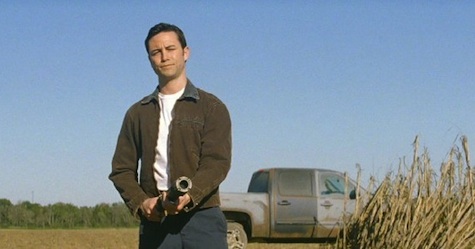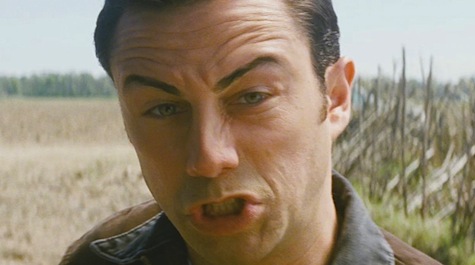This past week, the new science fiction action/thriller Looper opened in theaters to overwhelmingly positive reviews and solid box office numbers. I can see why: It’s a visually engaging movie with great performances from everyone involved, with good pacing and several gripping plot concepts driving it along. But, it’s also a muddled mess of a film that barely approaches being intelligent and instead relies on a lot of emotional clichés and overused tropes. Most damning, though, is that it violates its own premise, and makes perhaps the most mind-numbing choice a story can make: altering the basic rules of narration. Time travel movies can break a lot of narrative rules, but Looper does something that is not only technically offensive, but simply nonsensical.
[SPOILERS FOR LOOPER]
My biggest problem with Looper occurs right at the start of the movie with the voice-over narration from Joe (Joseph-Gordon Levitt.) Apparently, he is the one who is telling me his story: it’s the character’s “Call me Ishmael” moment. While this may sound a bit too Creative Writing 101, I didn’t like this approach because it was telling me rather than showing me what was going on. (The Mary Sue’s Rebecca Pahle said something similar, recently.) At first, I gave the narration a pass because I figured the filmmakers were just trying to get a bunch of exposition out of the way in order to get to the story as fast as possible. This, to me, is a problematic method of setting up your story and a hacky way to get at your themes, but whatever. This is just a big dumb Hollywood movie, right?
Well, wrong. Looper carries the weight of its considerable pretention, wearing it like an overcoat that bespeaks of refinement and intelligence. I suspect, however, that this costume was stolen, because any movie that takes as much time as it does with later scenes shouldn’t need a voice-over narration. Looper wasn’t adapted from a short story or novel, so really, why couldn’t these concepts have been depicted visually? Ah, but here’s the rub: they wanted the character to be able to explain directly to the audience at the end of the movie why he does exactly what he does. And they set it up this way (I suppose) to lull you into a false sense of security, because Looper’s story is all about the ending.
Let’s just get this out of the way: at the end of the movie Joe (the Joseph Gordon-Levitt version) kills himself, thus preventing his future self—Old Joe (the Bruce Willis version)—from traveling back in time and inadvertently creating a powerful crime boss/warlord in an attempt to kill said villain as a little child. And here’s where having the voice-overs from Joe are ridiculous: a character speaking to you can’t simply say casually at the end of the story “and then I killed myself.” Screw you, audience! Where is Joe as he’s telling us this story, then? Heaven? Hell? Looper purgatory? I’m not sure it matters, because I know where the screenwriters were telling the story from: LAZYTOWN. The reason they wanted a voice-over is to add to the shock value when Joe pulls the trigger on himself, thus saving the day. They also wanted it because they couldn’t figure out how to convince the audience in any other way that Joe saw the future of “The Rainmaker” and that the only way to stop it was suicide. (Charlie Jane Anders of io9 wrote a good piece the other day about why suicide is an overused and annoying time travel trope.)
Could they have removed the voice-over from the film and saved it? Well, it would be a little better, but I imagine most people would be scratching their heads as to why Joe shoots himself. I’d argue that this kind of lazy plotting is in the basic DNA of the movie itself.
Looper tries to get out of explaining some of its logical fallacies by having several characters bitch about confusing “time travel shit.” To me, this felt like the story itself was bullying the audience into not asking questions. It’s as if they were saying “Hey! Don’t complain about the confusing stuff in this movie or we’ll take your popcorn away. Just be quiet and watch the movie! Shhh.”

Early on, we’re shown very clearly how physical actions on a body in the present will manifest on the older body of the future. When Paul Dano lets his future version of himself escape, the mob cuts off parts of the young version’s body in order to get him to come back to base. The issue with this is pretty obvious: the mob has changed the future. How could the future version of Paul Dano have proceeded with his life and even existed in that form if his past self is now comatose and a paraplegic?
Because this little logical fallacy occurred towards the start of the movie, I didn’t mind. BUT, when Joe shoots himself at the end of the movie causing Old Joe to disappear from existence, we’re lead to believe the timeline has really been changed. But not with Paul Dano? Why? Because Paul Dano’s not the main character? The crime boss Abe (Jeff Daniels) says what they are doing with Paul Dano is “dangerous,” but doesn’t elaborate. Isn’t young Paul Dano effectively dead? Meaning the old version of him could never have looped and run away? Further, they make a big deal out of NOT killing Paul Dano’s younger self, but when Joe’s Looper runs, they have no problem trying to shoot young Joe. Why? We are never told, not even through a hammy voice-over speaking to us from… wherever.
Even setting aside all the inconsistent narration and time travel shenanigans, Looper also fails thematically. The movie’s plot, despite all the time travel and meeting yourself stuff, ends up not really being about that at all. Instead, it’s about trying to kill a genocidal monster when he’s a child, and then wondering if he has to turn into that person at all. In terms of aesthetic and theme, introducing creepy all-powerful children into your already crowded movie is slightly overpowering. When you set up a movie being about one thing, and it ends up being about something else entirely, I don’t really find that to be a smart or interesting twist.
When Joe shows up on Emily Blunt’s farm, it’s literally as though a brand new movie begins, one which is totally different from the one we’ve been watching. What was the point of Joe having a drug addiction? Just so Emily Blunt could chide him about going through withdrawal? Personally, I would have rather had a few more scenes in which Old Joe and Young Joe interacted. I thought that’s what this movie had promised to be about. Really, Bruce Willis only gets that one diner scene to chastise his younger self. There’s never an exploration of who people are and who people choose to become, at least not from the person who is supposedly the main character, which is saying something! If you’ve got two people playing the main character, you’d think you’d have twice the opportunity to do some character development. But they don’t, because the inexplicable voice-over is in charge. Why does Young Joe have a change of heart? Because the voice-over said so. Why will the little kid not grow up to be a tyrant anymore? Because the voice-over said so.

The voice-over also said “I changed it.” This is like a writer saying, “because I wrote it that way.”
Personally, I’d like the cheap narrative tricks in movies to be a little less transparent. Looper looks great and has some wonderfully fun action moments. But in the end, like Bruce Willis and his cloudy memory, I already want to forget it and have my memory replaced by a movie that made sense.
Ryan Britt is a staff writer for Tor.com. He really wanted to love this movie. Sorry!










